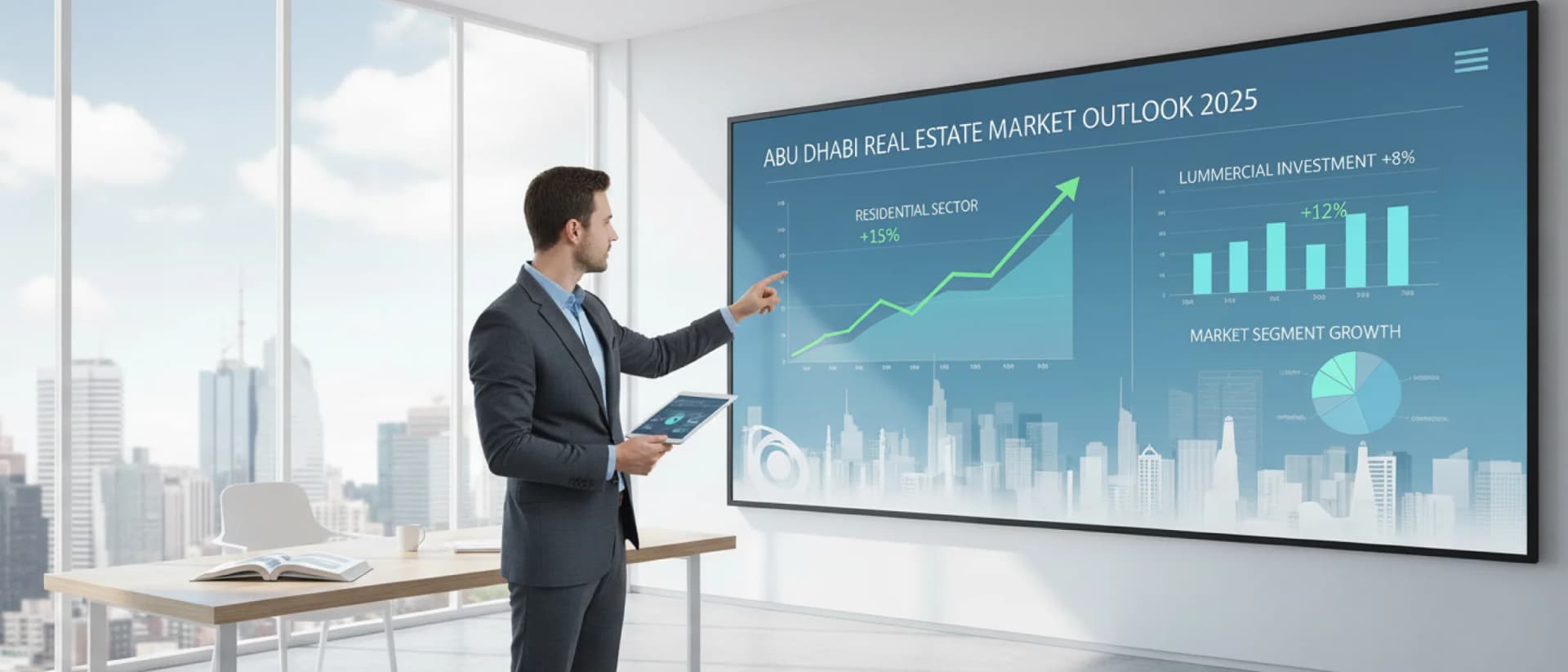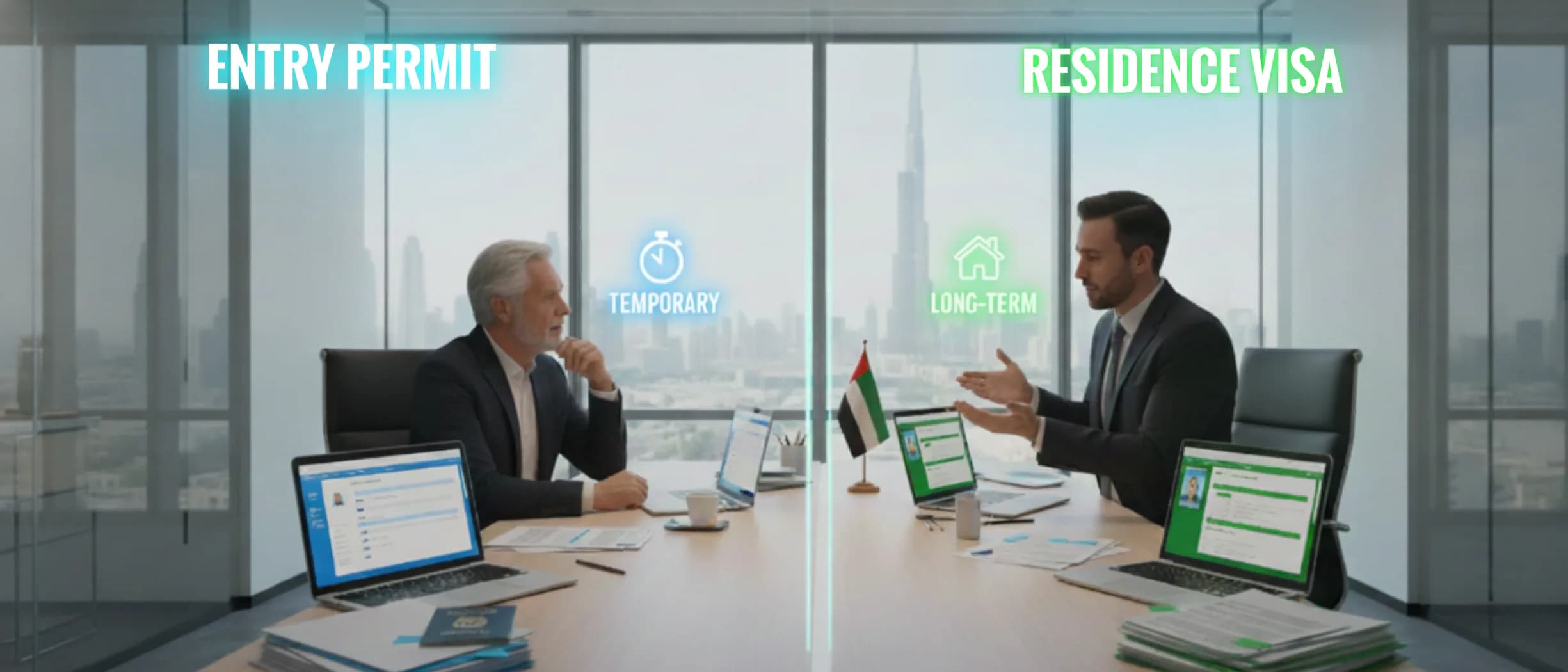
Adil Raza Khan | November 11, 2025

Abu Dhabi property registration fees in 2025 are compulsory costs that buyers have to pay to legally transfer property ownership. The normal registration fee is 2 percent of the purchase price, with additional fees for registering mortgages and NOCs. These charges are a guarantee that your purchase is safe, legal and in accordance with the Abu Dhabi property legislation.
When planning any property investment, buyers in approved freehold zones will have to consider these fees, including possible service fees, in both cases —residential and non-residential— for residents and foreigners. Good budgeting and knowledge of property fees in Abu Dhabi can help avoid surprises during the transfer of ownership.
Read APIL Properties’ expert guide to understand how to compute the Abu Dhabi property registration fees, understand the registration procedure, and make good investment choices in 2025-26.
Both off-plan and ready-to-move properties are charged a 2 percent property registration fee of the purchase price. Other charges are NOC fees (AED 500-5,000), mortgage registration (AED 2,500-3,500) and the annual service charges ( AED 10-35 per sq ft).
These Abu Dhabi property fees help buyers compare them with the average property price in Abu Dhabi and assess the average rental yield for properties in Abu Dhabi.
The buyer pays all registration fees during the transfer of ownership. Sellers do not pay these fees. The residents and foreigners are required to adhere. This addresses the question: Can foreigners buy property in Abu Dhabi? Yes, they can – in licensed freehold areas, they are permitted to pay the same registration and other property-related charges in Abu Dhabi as residents.
No, the Abu Dhabi property registration charges are levied on off-plan as well as those ready-to-move. In the case of off-plan development, fees are charged at full payment or mortgage settlement, which can be significant for purchasers who observe Abu Dhabi real estate market trends and news, where off-plan sales are strong.
No foreigners are charged less than residents, the base 2% registration, NOC, and mortgage registration fee (where applicable). However, acquisitions should be within preferred freehold regions. This is paramount to any individual who wants to buy a property in Abu Dhabi as a non-resident.
The cost of mortgage registration will be added to AED 2,500-3,500, although the foundation of the Abu Dhabi property registration will remain unchanged. During investment analysis, buyers should put both these costs in their budget in order to analyze Abu Dhabi property taxes and average rental yield in Abu Dhabi.
The payment of the fees is required upon transfer of the property after signing the Sales and Purchase Agreement (SPA) and handing over all the necessary documents to DMT. This will make sure that the rules on how to transfer property ownership in Abu Dhabi are followed.
Yes, in Abu Dhabi buyers are able to pay property fees via online portals of DMT or bank transfers and service centers and make it easier both to residents and foreigners alike.
No, registration fees are non-refundable. DMT also fixes them and cannot be negotiated, as this provides uniformity to all buyers in line with the trends of the Abu Dhabi property market forecast in planning their purchases.
These are the documents that are needed to know how to buy property in Abu Dhabi and registered correctly.
It normally takes 2-4 weeks after one has submitted all papers and paid all the necessary fees. Delays come in case there are incompleteness of documents or unpaid fees. This awareness will assist buyers to be aware of Abu Dhabi property market forecast timelines.
Yes. Buyers who require the AED 2 million+ Golden Visa which is also associated with Abu Dhabi real estate trends and insights regarding international investors, are required to be fully registered in approved freehold zones.
Besides Abu Dhabi property registration charges, buyers are expected to spend on:
Their inclusion will assist in comparison with average price of property in Abu Dhabi and possible average rental yield in Abu Dhabi.

The Abu Dhabi property market remains appealing to locals and international investors. In Abu Dhabi, off-plan projects account for close to 50 percent of transactions, and Saadiyat Island, Yas Island, Al Reem Island, and Masdar City are among those with escrow-protected payments, flexible plans, and high average rental yields. Real estate in Abu Dhabi analysis comes second to profitable decisions.
It is essential to pay Abu Dhabi property registration fees properly to obtain ownership as the law would ensure to prevent delays and fines. APIL Properties offers professional advice on making effective, profitable, and legally correct purchases.
Mandatory charges to legally register property ownership with DMT.
2% of the property’s purchase price, plus applicable NOC and mortgage fees.
The buyer is responsible for paying all registration-related fees.
No, the 2% fee applies; off-plan fees are paid after full payment or mortgage completion.
Yes, foreigners can buy in approved freehold zones and pay the same fees as residents.
Yes, mortgage registration adds AED 2,500–3,500, while the base 2% fee remains.
Fees are due at the time of ownership transfer, after SPA signing.
No, fees are fixed by DMT and non-refundable.
Passport, Emirates ID, SPA, NOC, proof of funds, and mortgage approval if applicable.
Typically 2–4 weeks after all documents and fees are submitted.
Yes, full registration in approved freehold zones is required for AED 2M+ Golden Visa eligibility.
Yes, including service charges, developer penalties, mortgage processing, and legal fees.

WRITTEN BY
Adil Khan is a Dubai luxury real estate expert with over 13 years of experience in the UAE property market. He is the Chairman of APIL Properties.

Entry Permit vs Residence Visa Dubai 2026 – The difference lies in purpose and duration.
The entry permit gives you temporary access to the UAE to either go there on tourism, employment or investment. Whereas - a residence visa will enable you to stay in the UAE in the long run after having done medical and ID formalities. You come with an entry permit, and upgrade to a residence visa in case you intend to work or invest in Dubai real estate.
Here is an APIL Properties expert guide on everything you want to know about Entry Permit vs Residence Visa Dubai 2026.

Retirement Visa in Dubai 2026 allows retirees aged 55 and above to live in Dubai long-term with a 5-year renewable visa. This APIL Properties expert guide details eligibility, the application process, costs, benefits, and lifestyle considerations retirees should consider.

Dubai Visa 2026 for foreigners allows international visitors, investors, and professionals to live, work, or explore Dubai under the UAE’s upgraded visa framework.
By 2026, Dubai will remain committed to delivering streamlined digital services, prolonged visa terms, and long-term residence schemes like the Golden Visa, which will simplify the process for foreigners to invest, work and settle in the UAE.
Foreigners may need to travel, invest, or relocate to Dubai. That is why – here is a total breakdown of the Dubai visa 2026: types, requirements, price, and the process to apply online.